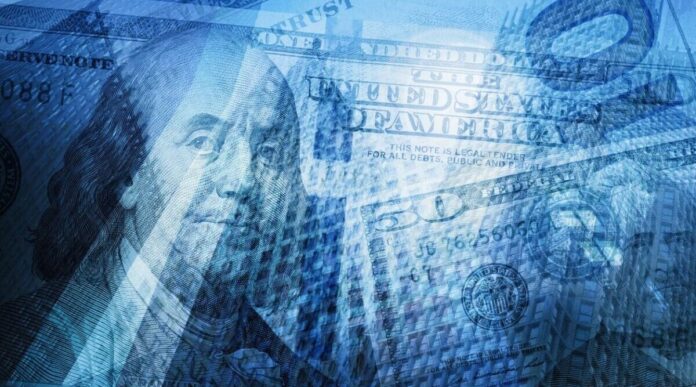Back when money was metal coins, emperors and kings would debase the money supply by multiple methods, including making a coin lighter, thinner, or smaller. They could also add less gold or silver and more copper or tin to the alloy used to mint the coins. This would result in a coin of similar size but with less value. If melted down the precious metal inside would be worth less than its face value.
When the United States debased its coinage, it didn’t try to slip one by the population. They just took all the silver out of dimes, quarters, and dollars from 1965 onward (the half-dollar contained 40 percent silver for a few more years.) Forward thinking individuals immediately scooped up the old coins that were 90 percent silver, thinking would one day be worth more than their face value. That’s an example of Gresham’s Law: “Bad money drives out good.”
This time around, the attempt to devalue the dollar isn’t quite as obvious, in part because there are no precious metals in our paper currency. Instead of printing a smaller bill, the government is simply producing more money. When the amount of money grows more quickly than production of goods on which to spend it, you get inflation as more money chases fewer goods. (If you are not familiar with this principal, please read yesterday’s post, which included a simple economic model illustrating inflation.)
Why Governments Like Inflation
Governments like a little inflation because it allows them to pay off debts using devalued money. Let’s say the government borrows $200 billion for ten years. If we five percent inflation for ten years, the government pays back the loan with money that is worth only about $126 billion (adjusted for inflation). As inflation rises, so do the taxes collected, which means the government has even more money to spend, even though each dollar buys less.
The same principle works for people who buy cars and houses. When inflation rises, you get to pay off your loan with money that is worth less and less. Your mortgage payment might have started out at 25 percent of your income, but in 10 years, it could be less than 15 percent of your income. This is why the interest on mortgages and car loans is higher during periods of high inflation.
This makes inflation sound great for the consumer, but that’s a fallacy. Wages do not rise as fast as prices. Consumers are always playing catch up. For example, social security payments will increase 5.9 percent for 2022, but people will have already been paying inflated prices for a full year before they see their increase.
How to Destroy a Fiat Currency
Every time the government borrows money, it increases the monetary supply and is inflationary. When the Federal Reserve buys debt from the Treasury and creates dollars, it is inflationary. When Congress raises the debt ceiling and allows the government to borrow more money, it is a vote in favor of inflation.
It should be obvious why we have inflation.
What is less obvious is why the power that be want inflation.
They want inflation because it destroys our currency, our confidence, and our way of life. Inflation creates an expanding upward spiral in which prices and wages rise to higher and higher levels until there is hyperinflation. The only thing that stops inflation is a massive recession, usually with deflation. Worse, if inflation does not end, it destroys the country, or at least the regime, and then the currency is worthless. None of these outcomes are good.
The Third Leg Weakens
As we discussed in part one of this series, food, energy and money are the three legs of the tripod that support most of human life on this planet. Take away one leg, and we struggle. Take away two, and we fall down. Remove all three, and we are helpless.
We talked about food shortages In Part Two and the coming energy crisis in Part Three. Either one is serious, but when you add a currency that is worth less every week (look at gas prices as an example), each of these crises grows worse. Yes, it’s bad that there is less food on the shelf, but it is worse when the populace cannot even afford what little there is. It’s terrible when blackouts hit because of natural gas shortages, but it is worse when people cannot afford to pay their heat bill or have to choose between heating or eating.
It’s been said that money makes the world go ‘round. I’m not here to argue orbital dynamics, but I will agree that it is almost impossible to live or function in our modern society without money, and the more the merrier. Inflation gives everyone less buying power. It steals your wealth while leaving your bank balances untouched. Inflation is insidious, until it becomes hyperinflation, and we all go broke in a matter or weeks or months.
Weakening America
I do not think the shortages are accidental and unplanned. I think they are a way to weaken America and to knock us down a notch. They are a way for the socialists to seize more power under the guise of helping us or even saving us.
I expect the trifecta of not enough food, gas, or money will create a great deal of anger. Some of this will manifest as anger directed at the Biden Administration. Anger and frustration could also result in large-scan protests and social unrest, not only in the U.S., but across much of the world. We could experience more civil unrest in 2022 than we saw in 2020, which was a year filled with months of protests, looting, arson, and destruction of private property.
The globalists in the World Economic Forum like to say is that in the future “You will own nothing and you will be happy.” What they really mean is that you will own nothing because you will be able to afford nothing, in which case you will turn to the state to provide you with basic income, basic healthcare and other services. You will be at the beck and call of the state because it will control your very survival.
That’s what they want, and that’s what we have to prepare to fight against. We need to be able to preserve our individual rights and sovereignty in the face of food shortages, energy outages, and money that is losing value.
In Part Five, we’ll talk about how.








